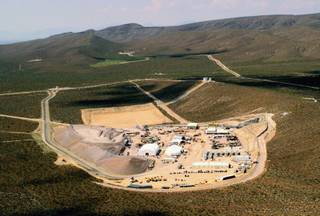Sun coverage
Can you predict the future?
It may seem like the sort of question best reserved for psychics’ studios and self-help literature, but it’s also likely to determine how the U.S. District Court of Appeals for the District of Columbia rules in the case that several states and Nye County have brought against the Nuclear Regulatory Commission regarding Yucca Mountain.
The states want the court to force the commission to keep working on the license application to make Yucca a nuclear waste repository until it runs out of money.
If you have been listening to Sen. Harry Reid recently, you might think the commission is out of Yucca money. But that’s not exactly the case: Although there has been no new money appropriated for Yucca in the past few years, the commission still has about $10.4 million in the bank.
That’s nowhere near Yucca’s $90 billion price tag, or even the upward of $20 million per month the commission and the Department of Energy were spending on Yucca development in its heyday. That’s why the commission and Nevada said during oral arguments before the appeals court judges on Wednesday that the NRC “doesn’t have enough money to continue the project in a meaningful manner,” said commission attorney Charles Mullins, and shouldn’t be forced to “throw good money after bad” by spending what little is left.
But the states maintain that “it is not the prerogative of the NRC to make that call,” said Andrew Fitz of Washington state, chief lawyer for the petitioners. “We will never have a nuclear waste repository, at Yucca Mountain or elsewhere, if the process Congress mandates in law is not followed by the executive (branch).”
Agencies are obliged to spend the money Congress annually appropriates for them, but they have some discretion over how and when they spend it because most government projects take more than a year to complete.
At Wednesday’s hearing, that practical consideration drove the judges’ questions, most of which hung on determining the nature of the NRC’s remaining $10.4 million: Is it the last money a never-to-be-finished project would see? Or is it what’s left to tide it over until Congress starts cutting big checks again?
At the core of each side’s argument, judges noted repeatedly, was the faulty assumption that the future is certain, which would determine how the commission acts now.
“Isn’t the writing on the wall? Ten million will be exhausted and it looks realistically like that’s it,” Judge Brett Kavanaugh challenged Fitz, questioning the logic of his argument that the remaining Yucca money must be spent as a matter of legal principle if, but for the $10.4 million, the Yucca project is dead.
A court order “will not be issued to do a useless thing,” said Judge Merrick Garland, who mused about how many unfunded and underfunded mandates there are in Congress. “How do we draw a line that doesn’t put us in the business of ordering the agencies to do things Congress hasn’t given them the money to do?”
But the judges were also agitated when Mullins argued that the NRC had to assume, because there is no Yucca money being appropriated now, there wouldn’t be any in the future.
“How do you know that? Prognostication?” Kavanaugh asked pointedly. “The president’s budget for the last several years hasn’t gotten a single vote. Why do we care what the president’s proposing ... what matters is what Congress appropriated.”
It’s far more likely, Kavanaugh went on to say, that Congress will postpone long-term budgeting until after November elections that might result in a change in congressional leadership and change the landscape on Yucca.
Republicans have been all but counting on a Senate majority to press forward on Yucca, thinking Reid’s chokehold on the Senate calendar is the only thing keeping Congress from voting to develop and fund Yucca as it did before. (In both 1982, when Yucca was placed on the short list of potential nuclear repository sites, and 1987 when Yucca was finally selected, there were 53 Republicans and 47 Democrats in the Senate, and the House had a strong Democratic majority.)
“You’re asking me to read Congress’ mind here,” Mullins protested in response to Kavanaugh’s questions.
“That’s exactly what we’re asking,” Judge Arthur Raymond Randolph answered. “Because that’s your defense.”
Although Randolph and Kavanaugh — appointees of the elder and younger Bush presidents, respectively — appeared to be convinced by the states, Garland — a Clinton appointee — seemed to favor the NRC and Nevada.
Garland repeatedly asked how much it would take to get the Yucca Licensing Support Network up and running again (about $6 million), how much it would cost to re-staff Yucca operations (about $10 million for 32 workers) and the cost to shutter Yucca again if Congress never appropriated another cent (no one had a good idea).
“It’s possible that just to staff up, just to recover the computer system, just to re-assign the bodies ... will cost more than the $10 million,” Garland concluded.
The U.S. District Court of Appeals in D.C. hears more cases involving agency conduct than any other appeals court in the country.
Still, the issues at play in the Yucca case fascinated judges enough that they kept lawyers in court Wednesday for twice as much time as they’d scheduled.
Two of three judges have to concur for a decision. If the parties are not satisfied, the only remedy that remains is to appeal to the Supreme Court. But given the infrequency with which the Supreme Court actually accepts petitions, it’s likely the appeals court judges will issue the final decision on this matter.


Join the Discussion:
Check this out for a full explanation of our conversion to the LiveFyre commenting system and instructions on how to sign up for an account.
Full comments policy